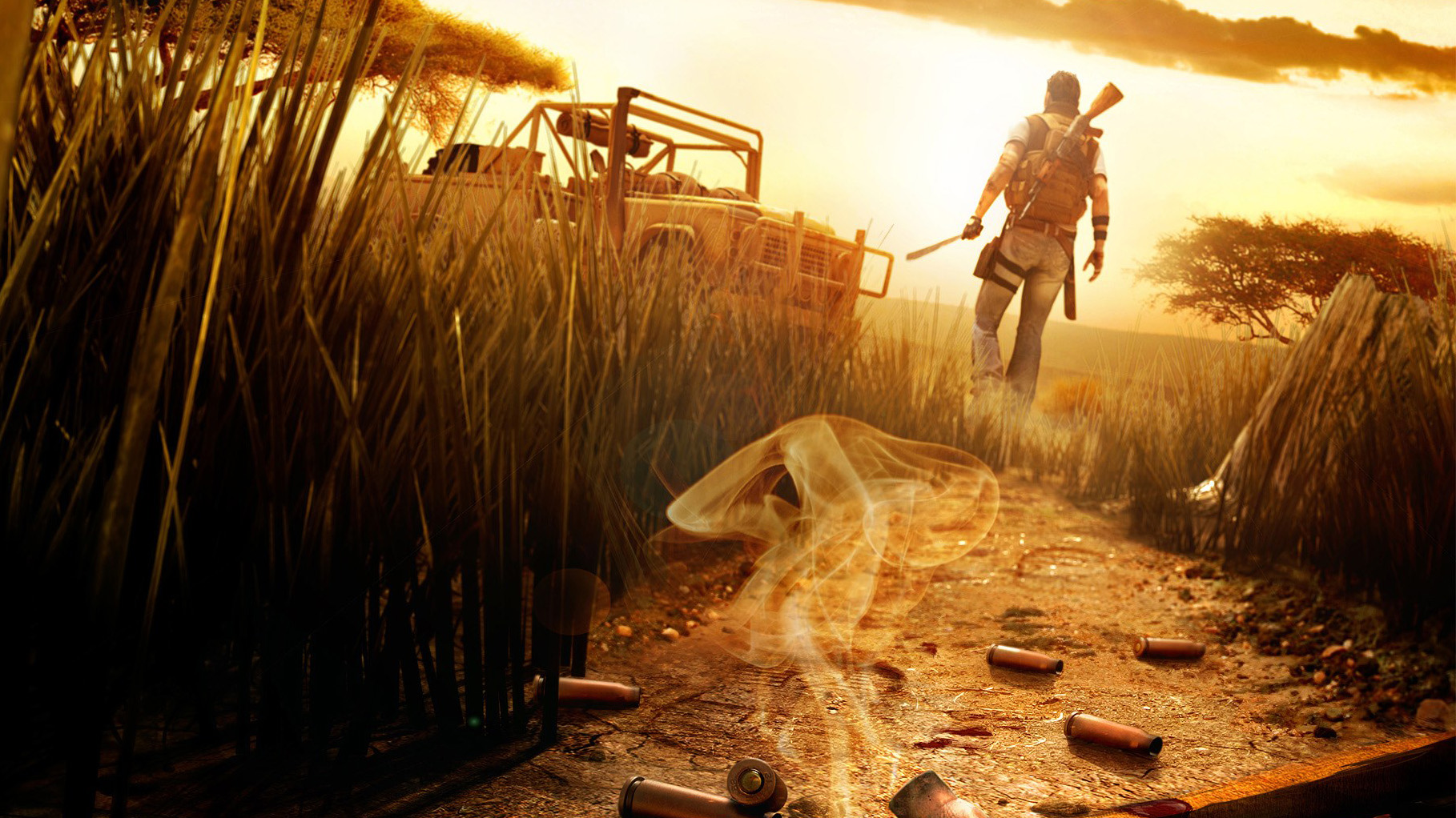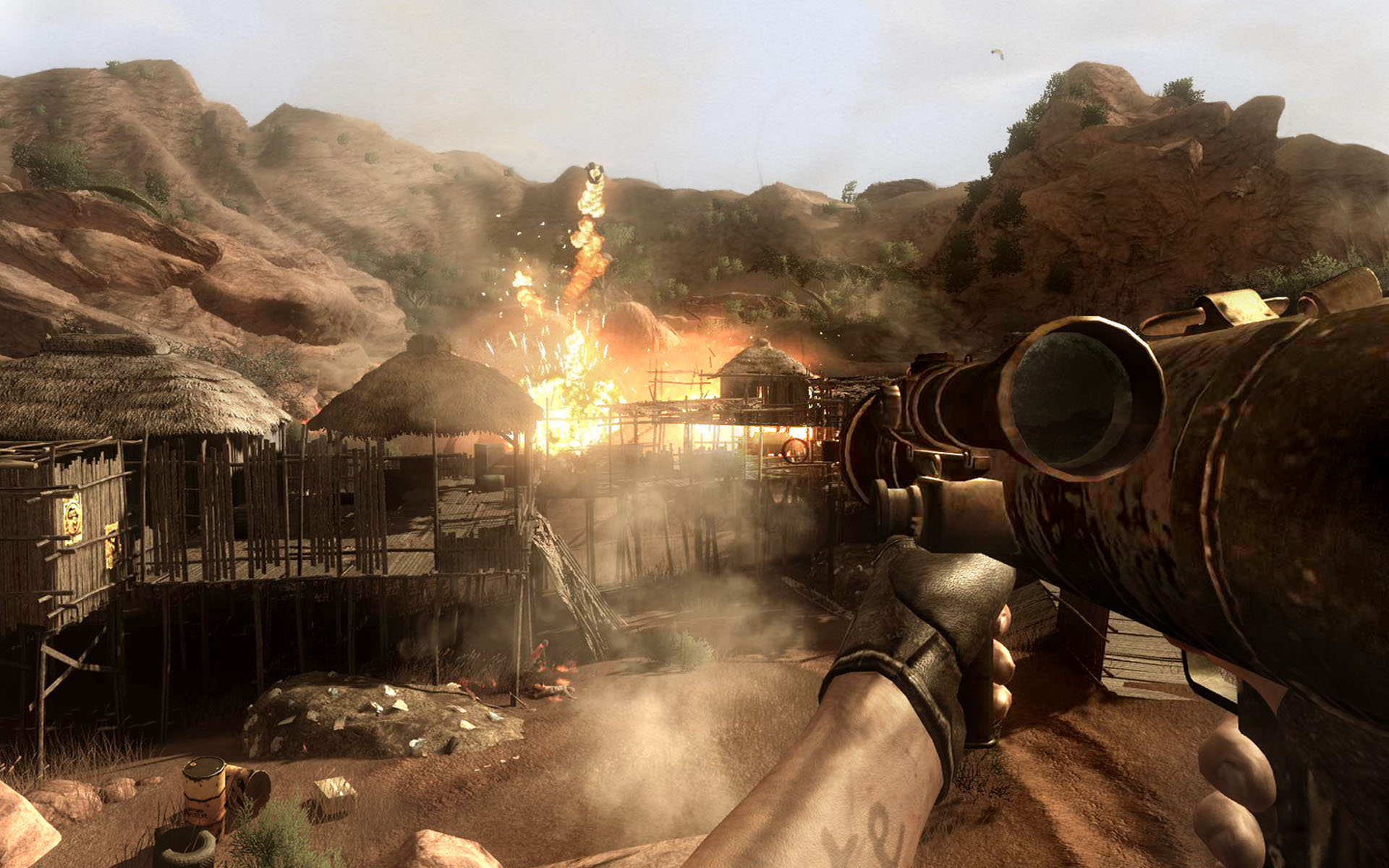Far Cry 2's daring open world design is still paying off
We look back at how Far Cry 2 changed the way designers looked at freedom and open worlds.

There are games like Doom that forever change their genres. Then there are games that don’t necessarily come to mind on a day-to-day basis, but which constantly re-enter the conversation when developers get together and talk. Far Cry 2 is a real developer's game: an imperfect gem to be sure, but one that changed the industry by changing how people thought about games.
Most of the time, you’re honestly of little consequence.
Far Cry 2's central genius is that it’s an open world that doesn’t exist to glorify you, the player. At best, you’re a villain. Most of the time, you’re honestly of little consequence. The intro sets the scene with you as the world’s least prepared mercenary, visiting Africa on the hunt for a wanted weapons dealer called The Jackal. It goes poorly. Before you can even begin the hunt, you catch malaria, end up bed-ridden, and have the Jackal himself pop round to go through your things, point out that you’ve failed miserably and won’t be paid, before wandering off with a “So long.” Few games have been quite so happy to lower the stakes to something that non-existent.
Of course, you don’t just go home. Instead the mission quickly descends into the kind of nihilism that wouldn’t be matched until the underrated Spec Ops: The Line. You kill because that’s what you do, working for two factions who were criticised at the time for being basically the same collection of psychopathic arseholes before people realised that yes, that was the point. There are no good guys in Far Cry 2, and no glorious crusade to save the war-torn country from some handy moustache-twirling dictator. There is only war, malaria, death and greed.
As would become a series staple, Far Cry 2 had next to nothing to do with the game that came before it save for being a shooter, and certainly none of the mutants and other silly elements that slowly took over its storyline. The developers, led by Clint Hocking, explained that the goal was to capture the spirit of the series, though it often felt (maybe cynically) like the money-men just weren't paying attention until it was too late.
Far Cry was a level-based game that just happened to have really big, open-feeling levels. Far Cry 2 was a playground. True, it wasn’t completely open, in that the story was still tied together with missions and specific objectives, and no matter how much you drove around killing things, nothing would change until the plot dictated it did. But once you were actually on assignment, it was anything goes. Snipe enemies from a distance, steal a car and go smashing into a base, run in guns blazing, set things on fire…
What made Far Cry 2 different from the average open world game was how it managed to embrace the potential of this freedom without either descending into anarchy or coming across as ridiculous. You’re certainly no godlike presence. Along with needing regular malaria treatments to prevent vomiting your guts up at the worst possible time, every system and plot point is there to reinforce the darker elements of the setting—whether it’s tracking down blood diamonds or conducting brutal assassinations that can only lead to more trouble.
Another legacy of Far Cry 2: one of the all-time great game trailers, thanks to perfect pairing with Massive Attack's Angel.
The biggest gaming news, reviews and hardware deals
Keep up to date with the most important stories and the best deals, as picked by the PC Gamer team.
More directly, even standard elements like taking a bullet go a little further than most. Get injured and you'll be ‘treated’ to unpleasant examples of your wounds being patched up in the field. Throughout the game you’re regularly paired with mercenary ‘buddies’ willing to lend a hand, drag your injured corpse out of danger and offer their own objectives, but none are saints. By the end of the game, the glitter of diamonds and chance of escape is more than enough to shatter any friendships.
Far Cry 2 inspired an industry to widen its perspective and explore the power that open worlds truly offered.
Really, Far Cry 2 was to the military shooter what Deus Ex had been to sneaking around urban environments—a game that made those environments into another weapon, and gave them the weight that had been lacking from most prior open world games like 2006’s cartoony Just Cause, or GTA and its endless copycats. It was also first and foremost a shooter, unlike RPGs like Fallout 3 or the clunky hybrid that was Stalker.
That greatly contributed to how smooth the action was, as well as the nature of Far Cry 2's basic play loops: clearing outposts, the simple act of navigating the world, and using its physics, tools and AI to prompt emergent action. These things made Far Cry 2 feel natural in small, vital ways.
Everything from checking a real map to the effect of a grenade (spoiler: it explodes) flowed realistically from your basic understanding of reality, with no need to think of the action in terms of hit points, levels and game mechanics. If something felt like a good tactic then it probably was, and when things went horribly wrong or right, it was usually in a way that made for an interesting story.

Despite all this, Far Cry 2 can feel clunky today. Much of it did at the time, too. Particularly strange is the way that characters speak twice as fast as they should and without much of that human thing we call emotion. The shooting isn't the best the genre has to offer. And it’s hard not to chafe at NPCs you’re working for still taking a pop at you every time you meet their patrols, or the world being a bit too static—there being no way to carve out safe spaces or even permanently deal with an outpost. It’s fitting, but still annoying. It’s also unfortunate that despite all the strides taken with the open world, Far Cry 2 ultimately backtracked on an initial plan where the point of the game would be to simply track down and kill the Jackal, and you could ignore the story in favour of making a beeline for him and putting a bullet in his head. The actual game had no such possibility. A real pity.
What it accomplished in the end, however, is even more impressive. It entertained players, but more importantly inspired an industry to widen its perspective and explore the power that open worlds truly offered. Later games have refined these techniques, with elements appearing in everything from Ubisoft’s own Assassin’s Creed, to the later Just Cause games, to The Legend of Zelda: Breath of the Wild.
Even where there isn’t direct influence from sitting down and playing Far Cry 2, there are few designers who haven’t at least heard whispered tales of what it accomplished and what it showed was possible. It may have spawned several official sequels over the past decade, but the true legacy of Far Cry 2 is the freedom it quietly inspired.

